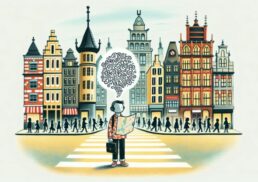Have you ever wondered who determines what information reaches your eyes and ears? Who are the unseen forces that shape your perception of the world around you? Welcome to the realm of gatekeeping meaning, a powerful process that influences the information we consume and, ultimately, the way we think. By understanding and challenging this complex phenomenon, we can work towards a more inclusive, diverse, and informed society.
Table of Contents
Key Takeaways
Gatekeeping is the process of filtering information for dissemination in various contexts, with gatekeepers and creators controlling access to resources.
Gatekeeping can have both positive and negative impacts on individuals and society. Transparency & accountability are needed to mitigate these effects.
Empowering individuals with tools & approaches can help them break through barriers imposed by gatekeepers.
Understanding Gatekeeping: Definition and Context

The term “gatekeeping” refers to the process of filtering information for dissemination, be it for publication, broadcasting, the Internet, or some other mode of communication. This concept is not limited to the media; gatekeeping theory has expanded to include face-to-face communication and the many-to-many dynamic present on the internet, which can sometimes reveal hidden gems of information that may not be accessible through traditional media channels or without the help of a gatekeeper.
From editors of news outlets to influencers on Twitter, gatekeepers and creators hold the key to the flow of information in various contexts, shaping public opinion and access to resources.
Gatekeeping in Media and News
In the media and news industry, gatekeeping plays a crucial role in managing the dissemination of information and forming public opinion. Some examples of gatekeeping include:
A news editor deciding which stories to prioritize and feature on the front page, thus influencing the public’s perception of the most important news events.
Media proprietors and advertisers having a say in the information being disseminated.
Money-driven decisions impacting the content and coverage of news.
These examples highlight how various factors can influence the information that reaches the public and shape their understanding of current events.
The effects of gatekeeping in media and news can be significant, shaping what we talk about and how we view the world around us. By controlling which stories are reported, how they are presented, and who is authorized to report them, gatekeepers can:
Sway public opinion
Influence political outcomes
Shape public discourse
Control the narrative
Limit access to information
These effects describe the power and responsibility of gatekeepers in shaping our understanding of the world.
Gatekeeping in Politics and Power
Gatekeeping also manifests in politics, as those with power and authority exert control over political resources including endorsements, funding, and media coverage. These political gatekeepers sculpt the political landscape by dictating who has a voice and whose interests take precedence.
The implications of gatekeeping in politics are far-reaching, affecting democracy and the distribution of power within political structures. By controlling access and promoting the interests of select groups, gatekeeping can perpetuate inequality and undermine the democratic process.
Addressing gatekeeping in politics necessitates fostering transparency and accountability, alongside enabling individuals to overcome existing obstacles.
Gatekeeping in Social Media and Online Communities
In the realm of social media and online communities, gatekeeping practices regulate the information, content, or access shared within these platforms. Gatekeeping in social media can be conducted by individuals, groups, or algorithms, filtering the content consumed by a particular audience at a particular time and space.
The consequences of gatekeeping on social media can be considerable, affecting the prominence, scope, and sway of certain concepts, points of view, or expressions within these platforms. This can influence the content that friends and followers see on their feeds, shaping their online experience and the information they consume.
Mitigating gatekeeping effects in social media demands the promotion of transparency and accountability, along with equipping individuals with the means to navigate barriers.
For more info, visit Exploring the Role of Gatekeeping in the Social Media …
The Origin and Evolution of the Term “Gatekeeping”

The term “gatekeeping” has been in existence for centuries, with its origin tracing back to a study conducted by German psychologist Kurt Lewin during World War II. What began as a literal term related to physical gates has evolved into a metaphorical concept that permeates various aspects of modern society, including:
Media
Politics
Education
The arts
For those interested in learning more about the term and its evolution, consulting a reputable source like Merriam Webster can provide valuable insights.
From Physical Gates to Metaphorical Barriers
Historically, gatekeeping referred to physical gates and barriers used to regulate access to certain areas or information. Over time, the concept of gatekeeping shifted from these literal physical barriers to more abstract, symbolic barriers, such as social, economic, or political structures that restrict access to certain resources or opportunities.
Metaphorical barriers in gatekeeping can take various forms, such as the utilization of language, cultural norms, and social networks to restrict access. The implications of these metaphorical barriers are far-reaching, with the potential to restrict access to resources or opportunities, leading to a lack of diversity and inclusion, as well as a lack of transparency and accountability.
Gatekeeping in Modern Society
In contemporary society, gatekeeping plays a significant role in controlling and filtering information for dissemination, be it through journalism, media, or the internet. Gatekeepers hold a crucial responsibility in determining what information is disseminated to the public and have the capacity to discriminate and filter candidates, opportunities, and access.
The impact of gatekeeping on individuals and society can be both advantageous and detrimental. On the one hand, it may aid in guaranteeing that only precise and reliable information is disseminated, while on the other hand, it may lead to the exclusion of certain voices and points of view.
To tackle and rise above gatekeeping, it’s vital to foster transparency and accountability, equipping individuals to navigate obstacles and champion fairer access to information.
Examples of Gatekeeping in Action
Gatekeeping can be observed in various domains, influencing access to opportunities, resources, and information. By examining specific examples of gatekeeping in action, we can deepen our understanding of the concept and its implications for individuals and society.
Gatekeeping in the Arts and Entertainment Industry
Within the arts and entertainment industry, gatekeeping involves regulating access to opportunities and resources, determining who is permitted to engage in specific activities and who is not. This process can create obstacles to entry, including financial, educational, or social barriers, making it challenging for certain individuals to access chances and resources.
The impact of gatekeeping in the arts and entertainment industry can be detrimental, restricting access to opportunities and resources, and resulting in a scarcity of diversity and representation in the industry. To counteract and overcome gatekeeping in this field, it’s key to endorse transparency and accountability, as well as enabling individuals to navigate obstacles.
Gatekeeping in Education and Knowledge Dissemination
In the context of education and knowledge dissemination, gatekeeping can regulate who is granted access to specific information or resources, and even determine the transmission of certain types of knowledge. This process can have an impact on access to education, learning opportunities, and the advancement of knowledge in society.
The advantages and disadvantages of gatekeeping in education are complex; while it can ensure students are adequately prepared for more advanced levels of study, it can also restrict access to knowledge and resources, engendering a feeling of elitism.
To challenge and overcome gatekeeping in education, it’s important to foster transparency and accountability, while empowering individuals to overcome barriers.
The Impact of Gatekeeping on Individuals and Society

The effect of gatekeeping on individuals and society is multifaceted, with both advantages and downsides. While gatekeeping can help ensure only reliable information is disseminated and protect vulnerable populations from exploitation or harm, it can also result in the exclusion of certain voices or perspectives and restrict access to information or resources.
Gatekeeping can be a powerful tool for controlling the flow of information, but it can also be a powerful tool for controlling the flow of information.
The Benefits of Gatekeeping
Despite its potential drawbacks, gatekeeping can offer some benefits. For example, it can aid in preserving quality by screening out irrelevant or low-quality information, ensuring that only the most pertinent and precise information is authorized through.
Additionally, gatekeeping can assist in safeguarding sensitive information by regulating access, ensuring that only the most pertinent and accurate information is authorized.
The Downsides of Gatekeeping
On the other hand, gatekeeping can have significant negative consequences. It can impede access to resources, services, and opportunities by establishing barriers to entry and restricting access to specific groups of individuals.
Furthermore, gatekeeping can perpetuate inequality by:
Creating and reinforcing power dynamics that favor certain groups over others
Leading to a lack of diversity in decision-making
Resulting in a lack of representation of certain groups in positions of power.
Ultimately, gatekeeping can also impede innovation by restricting access to resources and opportunities, preventing fresh ideas and viewpoints from being heard.
Challenging and Overcoming Gatekeeping
To confront and mitigate the effects of gatekeeping, we need to advocate for transparency and accountability, while enabling individuals to navigate barriers.
By exploring these strategies, we can work towards a more inclusive and equitable community where access to information, resources, and opportunities is not determined by a select few.
Promoting Transparency and Accountability
One method to counteract gatekeeping is by fostering transparency and accountability in the processes and decisions that dictate access to information and resources. Ensuring that all stakeholders are aware of the relevant rules and regulations, and that these are adhered to, promotes fairness and equal access.
Moreover, keeping all stakeholders informed of decisions being taken and the rationales behind them facilitates accountability and fosters trust, making it easier for them to decide on their course of action.
Empowering Individuals to Break Through Barriers
Another strategy in confronting gatekeeping is by equipping individuals with the tools to navigate obstacles and access the information, resources, and opportunities they desire. This can be achieved through:
Building credibility
Demonstrating authentic interest in the gatekeeper’s perspective
Transitioning leadership approaches towards inclusivity, cooperation, and empowerment
By following these strategies, individuals can effectively circumvent the obstacles imposed by gatekeepers.
Promoting transparency and accountability, along with investigating alternative avenues for acquiring information and resources, are crucial tactics in surmounting gatekeeping practices.
Summary
In conclusion, gatekeeping is a powerful process that influences the information we consume and the opportunities we have access to. By understanding its various contexts, recognizing its benefits and downsides, and employing strategies to challenge and overcome gatekeeping practices, we can work towards a more inclusive, diverse, and informed society. Let us break through barriers, advocate for transparency, and empower others to do the same, fostering a world where information and opportunities are accessible to all.
Frequently Asked Questions
What does gatekeeping mean slang?
Gatekeeping, a slang term popularized by the “Girlboss” movement, refers to someone who holds back information or limits another party’s participation in a collective identity or activity due to undue pettiness, resentment, or overprotectiveness.
What does gatekeeping mean in social media?
Gatekeeping in social media refers to the deliberate withholding of access, knowledge, information or opportunities by controlling who is allowed access. It involves selecting items of media to be consumed and filtering out those that are not suitable for the intended audience.
Why do I gatekeep?
I gatekeeper in order to gain a sense of superiority or control, and to boost my ego by being seen as an authority or true fan within my chosen community.
How does gatekeeping influence public opinion?
Gatekeeping can have a powerful influence on public opinion by determining which stories are reported, how they are presented, and who is allowed to report them.
This control over media coverage shapes people’s beliefs and can even affect political outcomes.
What are the potential benefits of gatekeeping?
Gatekeeping can ensure reliable information is shared, protect vulnerable populations from harm, and reduce the risk of inaccurate or misleading information being disseminated to the public.









